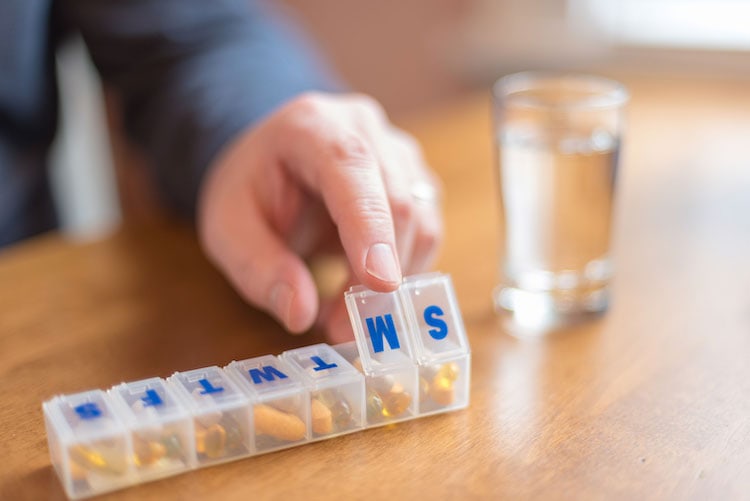If you take medication, especially more than one, it is easy to miss a dose or to mix up which one to take when. If you are caring for someone else, it is particularly important their medications be managed properly. Managing meds effectively is a function of good organization.
Organization means more than simply using a pill organizer. These can be very helpful in arranging pills in a way that ensures they are taken on a timely basis. However, today there are other ways to keep meds organized in a safe and effective manner:
1. Make sure to have an updated list of all medications.
Include the name, dosage, frequency, and side effects to watch out for. If the doctor stops a medication, indicate when. (Make duplicate copies of this list to give to your physicians and pharmacists.) This list can also be created as a spreadsheet on a computer to include the times the med should be taken. For those meds taken “as needed,” indicate what the drug is for, such as “for nausea” or “for stomach cramps.” If meds need refrigeration, this can also be noted. Be sure to list any drug allergies.
2. Today, medication apps are available on a smartphone.
With some, you can research information about the drugs, set up a medication schedule, and even get reminders to take them.
3. Consider using an automatic pill dispenser.
Automatic pill dispensers can be set to dispense the correct number of pills at the time needed. The device sorts and dispenses doses at the push of a button, and has both audible and visual reminders. An online app has a reminder alarm as well to alert loved ones if the drug wasn’t taken.
4. Use a different color bottle or pill dispenser for different times of the day.
For example, use a white pill organizer for morning, a blue for mid-day, a pink for the afternoon, and a green for nighttime.
5. Ask for “multi-dose” packages.
Ask the pharmacist for medications to come in “multi-dose” packages which contain the different pills that are to be taken together in convenient packages, each labeled with instructions as to when and how to take them. A 30-day supply is individually wrapped and labeled by dose, date and time… all packaged in a dispenser box with packs clearly labeled “morning, midday, evening and/or bedtime.” Simply tear one (or more) open at the indicated time. Many pharmacies offer this convenient service at no extra cost.
6. Check the labels on prescription bottles often.
Be sure to note the expiration date and refill information. If expired, properly discard. If running low on a particular medication, be sure to call the pharmacist for a refill.
7. Take pills at the same time and in the same place, as instructed.
Matching pill-taking to a regular routine, such as with breakfast or after brushing teeth, makes it easier to remember to take them.
8. Stay Consistent.
If using a pill organizer, fill it on the same day each week and at the same time. This will become a habit, ensuring the pills are ready when needed.
9. Keep medications in one place.
Choose an obvious, visible location, such as the top drawer of the nightstand, on a dresser, or next to the coffee maker. If there are young children in the home, be sure the medications are out of reach or in a locked cabinet.
10. Keep a checklist.
Make a simple checklist with the name of the medication and when to take it, then pencil in a check mark when it has been taken. Add a brief description of the pill (small, round, white) and any special instructions, such as whether it should be taken on an empty stomach or with food.
Another important tip is to select one pharmacy for all medication needs. This helps develop a relationship with the pharmacist who is an important part of the health care team. He or she can print a list of all medications and can help create a checklist to use at home. Be sure to advise the pharmacist of any changes to medications, drugs purchased elsewhere and/or medications given by the hospital to take home.
Managing medications for yourself or someone else can ensure taking the right drugs at the right time and it can help prevent adverse drug interactions. Knowing which meds are being taken and taking them correctly, provides peace of mind and the ability to devote extra attention to more important things, such as spending quality time with friends and family.
Contact Us
In addition to housing, healthcare and programs for seniors, SALMON Health and Retirement communities offer support groups and resources for caregivers and family members. To learn more about the options available to you and your loved ones, contact us today for more information.




